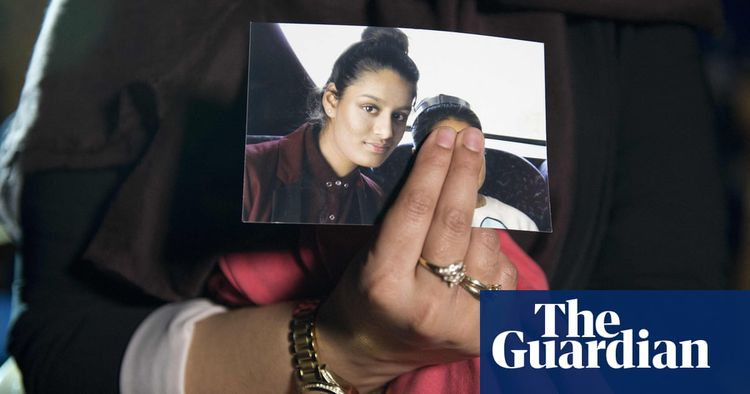Shamima Begum a victim of trafficking when she left Britain for Syria, court told

During the court of appeal hearing on Tuesday, legal representatives for Shamima Begum asserted that it was against the law to strip her of her British citizenship. Their rationale was that she was a victim of trafficking when she departed from the United Kingdom at just the age of 15 to join the Islamic State in Syria.
During the beginning of a three-day hearing, Samantha Knights' barrister KC argued that the Home Office and a lower court did not adequately assess whether Samantha had been groomed and urged that the decision should be reversed.
The knights claimed that Sajid Javid, who was serving as the home secretary at the time, did not take into account the possibility that Begum, who was still in school in east London, may have been groomed and trafficked. As a result, they argued that Javid violated the anti-slavery laws in place in the UK.
Knights stated in a written submission that the fact that the appellant was involved in trafficking was an important factor to consider in deciding whether it was appropriate and fair to take away her citizenship. The Home Office, however, did not take this into account. Because of this, their decision to strip her of her citizenship was against the law.
Knights stated that the appeal court should reverse the Siac's decision which supported Javid's ruling that was made in February. The reversal should be based on the same reasons.
The Siac court admitted that there was a strong possibility that Begum had been recruited, transported, and kept for the intention of sexual exploitation. However, this alone was not enough for the commission to take into consideration the home secretary's decision as unlawful.
The Home Office is set to present its evidence on Wednesday and is against approving the claim due to national security reasons. Their stance is that just because someone may have been coerced, it doesn't mean they couldn't pose a risk as a terrorist.
A group of three experienced judges will conduct a hearing that is part of a legal dispute that has been ongoing since Javid's choice to revoke Begum's British citizenship in 2019. Begum was taken into custody by Syrian Kurdish fighters following the downfall of the Islamic State.
In 2015, Begum departed from her residence in Bethnal Green, located in the east part of London, together with two of her classmates and journeyed to Syria to reside under the governance of the Islamic State. After the terrorist organization was defeated and she was interviewed, she expressed that she did not feel remorseful for coming to Syria.
Javid's decision was motivated by his belief that it would benefit the public to strip Javid of her British citizenship. He justified this move by stating that she would not become stateless due to her ability to obtain Bangladeshi citizenship through her parents. Despite never having visited Bangladesh and the country expressing disinterest in her return, Javid felt confident in his decision.
Begum is currently being held by Kurdish authorities in the north-eastern region of Syria. She has expressed regret over her past decision and now strongly opposes returning to IS. She has even stated that she would choose to die rather than go back to them. Begum has also expressed her willingness to be prosecuted for any terror-related charges in a British court if required.
The situation has previously been presented to the highest court in the land, wherein Begum was mostly found to be in the wrong. However, she was afforded an opportunity to commence a new legal proceeding if she could provide clear instructions to legal representation - thus leading to the current series of events.
The written statement from the Knights legal team presented to the court of appeal suggests that Begum was systematically prepared to join ISIS over several months before departing from the UK in February 2015. Additionally, the team claims that her journey to reach the terrorist organization was organized by someone associated with both ISIS and the Canadian Security Intelligence Service.
Begum encountered a man named Mohammed al-Rashed when she arrived at the Istanbul bus station to continue her trip to Syria. The Canadian intelligence agency, CSIS, has confirmed that al-Rashed also worked as an informant for them.
According to her legal representatives, she was able to leave the United Kingdom because of shortcomings on the part of state institutions. The Metropolitan Police, her school, and Tower Hamlets Council all contributed to her trafficking by failing to fulfil their responsibilities. These "state failures" were also responsible for her departure.
According to Knights' testimony in court, the state's shortcomings in this particular case were very relevant because they could have easily taken action to safeguard the appellant and stop her from leaving the country. Additionally, the appellant's family were quick to respond once they were notified that she was missing.
Sir James Eadie KC submitted a piece arguing that Javid had the power to decide which factors to consider when revoking someone's British citizenship, according to the law.
According to Eadie, the secretary of state knew there was a chance she may have been influenced or convinced to take extreme actions before she went on her trip. So, the only thing left to consider was how significant these possibilities were. The secretary of state was responsible for making that decision.
In earlier court hearings, it was revealed that the British security agency MI5 advised Javid that Begum had spent four years in Islamic State territory and had supported the terror group during that time. Additionally, the agency noted that the general public in the UK holds very negative opinions about her.
The verbal discussions in the appeals court should end by Thursday and a verdict will be announced at a later time. The judges in charge are Lady Carr, Lord Bean and Lady Whipple.























































